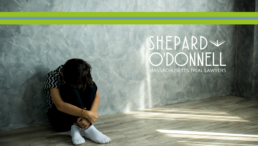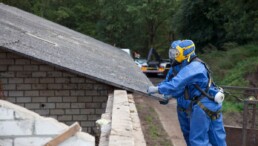The road to healing for survivors of physician sexual assault is long and difficult, and no two experiences are the same. Although no one can truly understand your experience in the way that you do, in our time working with survivors of physician sexual abuse, we’ve learned about some of the primary emotional hurdles survivors experience. We’ve worked with alleged victims of Dr. Derrick Todd as well as those allegedly abused as children by pediatrician Dr. Richard Kauff. We know that it takes an immense amount of courage to seek legal counsel and we understand that not everyone is ready to take that step. No one who has been sexually abused or assaulted is to blame and perpetrators, especially those in a position of trust, should be held responsible. While the emotions outlined below may not mirror your own, we understand the complex and difficult emotional journey survivors face.
A Difficult Journey to Healing
Sexual assault is never the survivor’s fault.
Nevertheless, survivors are often embarrassed to acknowledge that this terrible crime was committed against them, fearing judgment from those around them. They may feel they won’t be believed, especially if the crime occurred many years ago, as in the case of some pediatric abuse cases. They may also feel ashamed and wonder how they could have “let it happen.” And yet, the inherent imbalance of power in a doctor/patient relationship makes it very difficult for a patient to know whether what the doctor was doing was actually a normal part of the examination, as they asserted it was.
These complicated emotions are especially true for children, most of whom do not have the capacity to recognize that certain behaviors are, in fact, abusive. It can be extremely difficult for children to identify sexual abuse in a doctor’s office where part of a routine physical examination requires them to remove their clothing. Children cannot be expected to understand when aspects of an examination cross a line. Even if they suspected something was not right, as children, they likely would not have been able to articulate exactly what happened or advocate for themselves sufficiently. They may also feel that adults wouldn’t believe them.
This fear of not being believed, even as adults, is sometimes compounded by the fear of being ostracized or judged by friends, family, or even colleagues when they learn of what happened to them when they were so little. Victim-shaming is a profoundly damaging reality and unfairly shifts the burden of responsibility from the perpetrator to the victim. Addressing victim-shaming requires a shift towards understanding, empathy, and support for survivors, focusing on holding perpetrators accountable and creating environments where individuals feel safe and validated in sharing their experiences.
Survivors of childhood physician sexual abuse can also experience feelings of guilt, wrongly assuming that they somehow encouraged or allowed this behavior. They may resist coming forward with their story because they don’t want to upset a parent or caregiver, especially if other family members were patients of the same doctor. Although there is nothing they could have done to prevent the behavior, they may feel that they should have done something to protect a sibling. The same is true for parents who were unable to protect their children from the abuse. As in the case of Dr. Kauff, parents were often in the room at the time of the abuse and may feel tremendous guilt and shame at not having understood what was happening. Unfortunately, this alleged predator managed to hide his actions through deceit and lies.
Some victims feel a sort of ambivalence, not fully acknowledging or understanding the trauma inflicted on them when they were so young. This, too, is normal, though working through past traumatic experiences can sometimes lead to enlightening self-discovery. Adult survivors of childhood physician sexual abuse often experience “white-coat syndrome,” which is a deep-seated fear of going to the doctor. They may engage in negative or inappropriate relationships, or have difficulty with emotional and sexual intimacy. Others may struggle with a range of mental health issues, including depression, post traumatic stress disorder, eating disorders or addiction that prevent them from sharing their experience. Better understanding the past sometimes leads survivors to better understand some of the life choices they’ve made, allowing them to move forward in a positive direction.
Anger is, understandably, a large part of the emotional journey of a survivor of childhood sexual abuse by a physician. Individuals wonder how those around them could have let this happen and anger directed towards a parent or caregiver can damage family relationships. More common, however, is the justifiable anger directed at the offending doctor and the institutions that failed to protect victims from a dangerous predator. That anger can be usefully channeled into seeking justice for the crimes that have been committed against them.
Hospitals and Clinics Should Also Be Held Responsible
Hospitals, clinics, and other medical institutions that allow physician abuse to occur must be held accountable. Everyone at the facility has a responsibility and a duty to protect their patients and staff, especially if those patients are children. Valid questions to determine whether institutions have done all they could to protect victims include:
- Do they provide sufficient oversight?
- Do they audit their physicians’ practices from time to time?
- Is there a nurse or other staff member in the exam room to keep behaviors in check?
- Do they screen doctors and staff for past child abuse issues?
- Do they have easily accessible channels that facilitate victims coming forward?
- Do they require training to maintain appropriate boundaries?
Failing to protect those in their care can be considered negligence, for which compensatory damages could be available. Individuals who have suffered at the hands of their physician deserve to be adequately compensated.
Call For Legal Advice Before Time Runs Out
We understand that survivors of abuse may be reluctant to come forward and pursue a claim, however, we encourage you to take the important first step in holding your abuser accountable before it’s too late. In Massachusetts, victims of childhood sexual abuse must file a claim within 35 years of when the abuse occurred, or within 7 years of the time they discovered an emotional or psychological injury, whichever period expires later. Some victims of Dr. Kauff are now in their 40s, and this time limit is fast approaching. For survivors of sexual abuse as adults, that statute of limitations is just three years. Call us at (800) 451-4471 for a free, confidential, no-obligation discussion about possible legal action. We would be glad to explain what’s involved in the process of filing a claim. Read more about how we work with sexual abuse survivors in our blog.
Look After Your Mental Health
If you are a survivor of physician sexual assault or abuse, any emotions you may be experiencing are valid and we encourage you to be patient with yourself on your path to healing. Below is a collection of resources we have found that are available, either free of charge or at an affordable cost, for survivors of sexual assault and abuse.
- 24/7 Domestic Violence & Sexual Assault Hotline: 508-588-8255
- Health Imperatives
This program includes nutrition assistance, a domestic violence shelter, sexual assault counseling, and more. - Joyful Heart Foundation
The mission of the Joyful Heart Foundation is to transform society’s response to sexual assault, domestic violence, and child abuse, support survivors’ healing, and end this violence forever. - Massachusetts 2-1-1
Simply dial 2-1-1 on your phone to be connected to someone who can help you find health and human services available in the community. It is available 24 hours a day, seven days a week. - Trauma Resource and Support Program at Cambridge Health Alliance
If you or someone you love has been affected by violence, hatred or abuse, the Trauma Resource and Support Program is here to help and works directly with victims to help them find community resources, medical services and the courts. Our services are always confidential and are provided at no cost. - The Boston Area Rape Crisis Center
The Boston Area Rape Crisis Center’s mission is to end sexual violence. We empower survivors of sexual violence to heal and provide education and advocacy for social change to prevent sexual violence. - Substance Abuse and Mental Health Services Administration
SAMHSA is the agency within the U.S. Department of Health and Human Services that leads public health efforts to advance behavioral health. - Day One RI
Day One is leading efforts to address sexual assault as a community concern. We are committed to supporting survivors and increasing prevention. - Open Path
Open Path Collective is a nonprofit network of psychotherapy professionals who offer discounted services to members. Providers offer both in-person and telemedicine services. Rates for mental health services are offered at a significant discount to prevailing local prices.
If you are a survivor of physician sexual assault or abuse, any emotions you may be experiencing are valid and we encourage you to be patient with yourself on your path to healing. When you’re ready, we are available for a confidential, no-obligation discussion about possible legal action, but in the meantime, we urge you to put your mental health first.








